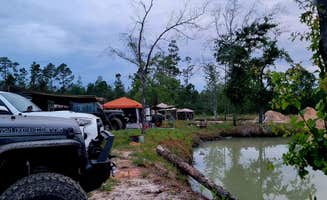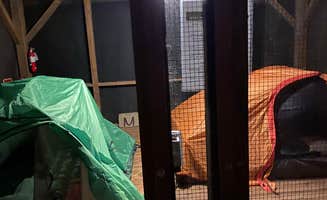Tent camping opportunities near Lakeland, Georgia span across multiple counties in southern Georgia and northern Florida. The area features flat sandy terrain with pine forests typical of the Coastal Plain region. Winter temperatures average 45-65°F while summer temperatures regularly exceed 90°F with high humidity, creating distinct seasonal camping considerations for tent campers exploring the Lakeland area.
What to do
Water activities at Reed Bingham State Park: The park's 375-acre lake provides excellent swimming and paddling opportunities for tent campers. The Paddle-In Island Pioneer Campsite offers a secluded tent camping experience accessible by water.
Hiking forest trails: Twin Rivers State Forest Primitive Campsites provide tent campers access to trails through mixed hardwood and pine forests. The campground sits at the confluence of the Withlacoochee and Suwannee Rivers, creating unique hiking opportunities through varied ecosystems.
ATV and dirt bike riding: DirtCamp caters specifically to off-road enthusiasts with trail access. "I've stayed here two times so far and will be back again!" notes Ali P., highlighting the repeat appeal for tent campers who enjoy riding.
What campers like
River access campsites: Woods Ferry River Camp receives praise from campers for its convenient water access. "We have been down the Suwannee many times and always stay in woods ferry for FREE!!! Bathhouses electricity potable water shelters!!" writes Kayla B., emphasizing the unusual combination of amenities and no-cost camping.
Working farm experience: The Week's Place offers tent camping on an active farm, allowing campers to observe agricultural operations. Ashley F. notes the strategic location, mentioning you can "day trip to The Little Grand Canyon, the Okefenokee, Tallahassee, FL, Westville, Macon" from this property.
Screened sleeping platforms: Holton Creek River Camp features elevated platforms with unexpected amenities. Tyler R. explains, "The platforms are amazing. Power, fire ring, and running water. Hot showers also," providing tent campers protection from insects while maintaining an outdoor experience.
What you should know
Hunting season awareness: When tent camping at Dixon Memorial WMA, verify hunting schedules before arrival. Dustin P. advises, "This is a hunt camp so be sure to check the season before going," noting he "went in late December and had the spot to myself."
Weather considerations: Summer thunderstorms can develop quickly in the Lakeland area, particularly in afternoon hours. Prepare for sudden rain and have appropriate shelter.
Limited cell service: Many tent camping areas around Lakeland have spotty or non-existent cell reception. Download maps and information before arrival.
Tips for camping with families
Pack water transport solutions: At Woods Ferry, Tyler R. mentions, "Clean and well maintained... bathrooms are nice. Fire rings at every site. 4 or 5 grills available," but families should note the steep access ramp requires planning for gear transport.
Consider alternative sleeping arrangements: Beyond traditional tent options, Holton Creek accommodates family camping with structural amenities. "Many units also have hooks to hang you hammocks," notes Jeanene A., providing alternatives for kids who enjoy suspended sleeping.
Pack entertainment options: Limited recreational facilities mean families should bring their own activities. Board games, wildlife identification materials, and outdoor sports equipment help keep children engaged.
Tips from RVers
Site selection at primitive areas: While focused on tent camping, some sites accommodate small RVs. La T. at DirtCamp remarks, "I really enjoyed staying here this pasted weekend have a great time riding the trails camp spot was amazing aswell!!" highlighting the dual appeal for those with recreational vehicles.
Prepare for minimal hookups: Most tent-focused campgrounds near Lakeland offer limited or no RV facilities. Bring sufficient water and power resources.
Narrow access roads: Many camping areas have unpaved, narrow access routes. Scout ahead or call campground hosts for current road conditions before bringing trailers or larger vehicles.



